#the first world war serbian
Explore tagged Tumblr posts
Text

Petar I Кarađorđević, King Peter I of Serbia on the battlefield of the Morava Valley during the First World War
Serbian vintage postcard
#postal#petar#historic#ansichtskarte#sepia#vintage#tarjeta#serbia#peter#the morava valley#briefkaart#the first world war serbian#photo#petar i кarađorđević#king#кaraorevi#battlefield#world#postkaart#ephemera#serbian#postcard#morava#valley#postkarte#photography#carte postale
4 notes
·
View notes
Text
I don't like being Serbian anymore
#history of serbian is shit#they only teach you about how we werre treated by the ottoman empire in the first world war though#but world war 2 they just dont rlly#im sorry bosnians#im sorry kosovars#im sorry albanians#i hate myself#sorry if i accidentally spread misinformation in the past#i still dont think serbia should get bombed again bc i saw that sentiment like 7 times at least i think on accident and its oike#why. who would that help or benefit#sorry
3 notes
·
View notes
Text

Infantry Officer's Flat Cap from the Kingdom of Serbia dated to 1914 on display at the Heeresgeschichtliches Museum in Vienna, Austria
This cap was worn by an officer attached to the King of Serbia. During the First World War the Kingdom of Serbia was ruled by King Peter I, of House Karađorđević who had an extensive military experience before the war. He had joined the French Foreign Legion during the Franco-Prussian War, was involved in the Paris Commune, fought as guerilla during the Great Eastern Crisis and after his coronation led the Kingdom through the Balkan Wars.
By the time of the First World War he had retired due to ill health and his son, Crown Prince Alexander, took over Royal Perogatives. During the war he would visit the front lines to promote morale for the Serbian forces. On one memerable visit he picked up a rifle and shot at enemy soldiers.
Photographs taken by myself 2022
#uniform#military history#first world war#serbia#serbian#kingdom of serbia#art#fashion#20th century#heeresgeschichtliches museum#vienna#barbucomedie
0 notes
Text
(limited to Europe because there are limited slots per poll)
*The Long 19th century is the period between the French Revolution and the The First World War.
The French Revolution: The original, the classic. It's got Robespierre and Marat and a Guillotine.
The Serbian Revolution: Resisting Ottoman Rule? Forming a new state? Creating a Constitution? Serbia kicked it off in the Balkans nevermind that it took three tries and three decades.
The Greek Revolution: Have you become hopelessly invested in the idea of Greece as the cradle of civilization? Do you want to die fighting for it in a way that is tragic and romantic? Then you might be Lord Byron.
The Carbonari Uprisings: Secret societies are more your speed? Here is one in Italy doing their best to try to make liberal reform happen.
The Decembrist Revolt: So, a bunch of officers came back from Napoleonic Europe wanting to see constitutional change and possibly the abolition of serfdom. Sounds reasonable, right? Right??
The July Revolution: Can you hear the people sing? You know the one, barricades and the most iconic painting in French history. Louis Philippe ends up on the throne and he is....sexy to someone.
The November Uprising: Congress Poland decides that they are sick of the tsar. Poland undertakes a tragically doomed struggle against Russia.
The Belgian Revolution: The Belgians decide to file for divorce from The United Netherlands. Leopold of Saxe-Coburg ends up on the throne and he's sexy.
The 1848 Revolutions: The Springtime of the People! Revolutions everywhere: France, Hungary, Poland, Austria, The Italian and German States.
The January Uprising: The third time is the charm on kicking out the tsar and making a Polish state, right?
The Paris Commune: Napoleon III abdicates and leaves after being thumped by the Prussians. For two months, a communist people's regime rules Paris.
The Russian Revolution of 1905: This is not the one with Lenin yet! This is the one that forces Nicky to create a Duma. Some consider it the dress rehearsal for what would come next.
#napoleonic sexyman tournament#we need a new tag for extra polls#this is why people like the 19th century by the way#look at all those revolutions
257 notes
·
View notes
Text
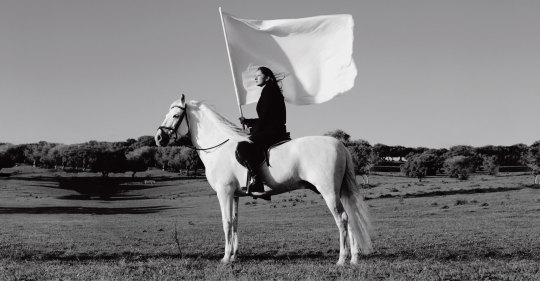
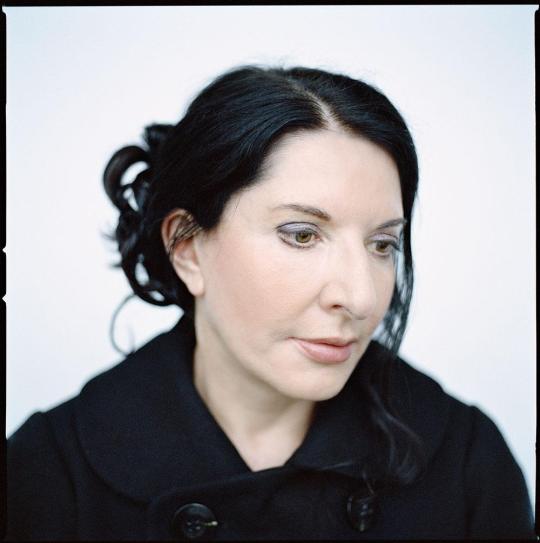
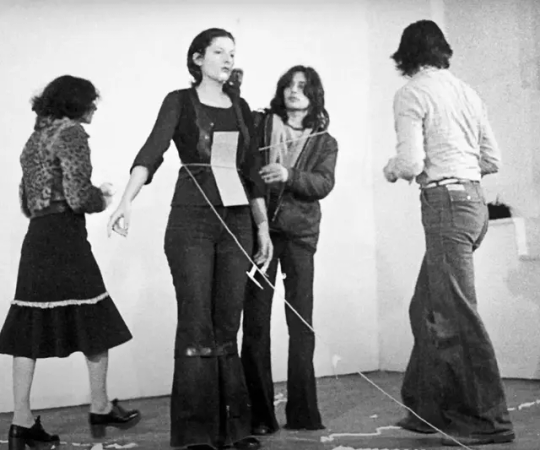
Being Scorpionic (Dark Feminine) in an Abrahamic World: Natal Chart of Marina Abramović
I’ve been learning more about Marina and how she’s accused of being a Satanic and demonic artist, so I expected her having Jyestha or Scorpio and its her lagnesha! and she has Scorpio stellium.

Jyestha natives, especially women, can be subject to being called demonic or satanic for their self-expression, such as Vampira.
The first thing I noticed is Marina has two tight conjunctions: 1) Sun Mars Ketu in 8th and 2) Jupiter, VenusR, MercuryR in the 7th.
Ketu and Mars (lagnesha) in Jyestha conjuct her Sun in 8th
Marina’s entire public career has been colored by 8th house themes: accusations of witchcraft and evildoing, she has darker features and wears black clothing, the extreme nature of her performances, she openly discusses her abortions (which I believe is an 8th house theme), she is inspired by Eastern spirituality, and discusses art as a ritual.
Libra 7th stellium in Vishaka
Her lover of twelve years Ullay was also an artist and the two collaborated frequently, breaking up in a performance piece where they walked the great wall of China. Vishaka can symbolize the lightning bolt of inspiration, but also duality.
But as the case for many Martian women, Ullay was jealous of Marina’s power and career, which led to the demise of their relationship. With her Chiron in Swati which falls in Libra, much of her wounding and subsequent empowerment comes from relationships in this lifetime. Furthermore, Marina considers herself and her art a mirror to the public, which is fascinating because she works with the body (Aries 1H) which mirrors the 7th.
Anuradha Sun + Krittika Rising + Cap 10th
Marina has been extremely devoted to her art, forgoing being married and having children to pursue her art. Anuradha is the star of Devotion in Scorpio, conjunct her Mars, and she has a Krittika rising explaining her obsessive drive to make art.
SaturnR in Cancer in 4th
She is the child of two Serbian war heroes and grew up in a very militant household. In particular, Marina never had a good relationship with her mother and described her as physically abusive.
(I’m wondering if a mother wound is a precursor to spiritual mastery.) She says her tough upbringing taught her many hard lessons she learned to appreciate and allowed her to become an artist, and it inspires much of her art.
Her AK is Moon in 10th in Cap
Marina said she could not pay her light bill until she was 50 She has been a working performance artist for over 50 years. In Saturnian fashion, Marina was harshly criticized in her youth then regarded as a genius/ahead of her time much later in life. However, Dhanista is the nak of fame and she is extremely famous for her art.
Gemini 3rd H connected to 7th and Leo 5th H connected to 8th with lagnesha in Mars sign
She identifies as a performance artisrt, using the body for work is classically martian, especially with the houses of performance linked to both her stelliums. Specifically, Marina is known for pushing her body to extremes and much of her art deals with violence and blood, specficially toward the feminine body.
Lillith in Mula (9th)
Mula is the root of transformation, Lillith is the dark feminine This placement carries over from her D60 or past life chart. She has Ketu in this nak in her D60 chart as well. In fact, she was very Scorpio in her last life as well. Perhaps this is why she’s very comfortable in her dark feminine energy.

Pluto in Ashlesha (4th) With this and Saturn in her 4th, Marina learned hard lessons around femininity and was deeply transformed by her upbringing to transform the feminine consciousness. Ashlesha is a deeply embodied Nak and Marina was a trendsetter in making the art world accept performance art as an art form.
Neptune in Hasta (6th)
Marina is very perfectionist and dedicated to her art, and the mystical/devotional elements of Hasta may suggest her inspiration comes from divine sources.
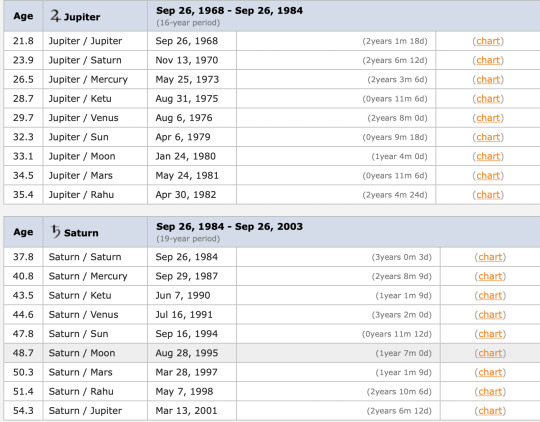

For much of her career Marina was in her Saturn Mahadasha, and Saturn rules outsiders and outcasts. Now in her Ketu Mahadasha (she has Ketu conjunct her lagnesha and her Sun) people are starting to understand her and her artistry better. Her Venus dasha begins in her 80s and this will be a very interesting period for her and her career.
In summary, a woman this Martian and Scorpionic would be absolutely ridiculed, judged, and misunderstood under Abrahamic patriarchy.
75 notes
·
View notes
Text

Serbian women from the Jeftović family, village Svinjare, vicinity of Kosovska Mitrovica, Serbia. Photographed by the Austrian occupation in the First World War. Bildarchiv ÖNB.
#serbia#balkan#kosovska mitrovica#svinjare#ibarski kolašin#southern serbia#1910s#kosovo and metohija
55 notes
·
View notes
Text
"In this context we want to return to Mason’s thesis that ‘from 1936 onwards’, ‘both the domestic and foreign policy of the National Socialist government became’, ‘increasingly independent of the influence of the economic ruling classes’. The important word here is ‘influence’. The thesis does not contradict the Marxist interpretation of state and society, but rather its mechanistic, superficial distortion. Marxism implies that there is no absolute correspondence between base and superstructure; both levels have their own inner logic, determined by the division of labour. Hence, in class societies not only religion and philosophy but also the state and army are to a certain degree autonomous. The key element is not whether a group of bankers or big industrialists ‘dictate’ decisions to the head of state or the army, but whether such decisions correspond to the class interests of big finance and industry, and can be understood as resulting from the inner logic of the given mode of production. Mason overlooks the fact that in the context of monopoly capitalism militarism and war, long before the NSDAP, war and militarism had achieved such autonomy. Indeed, the term ‘primacy of politics’ was produced precisely by the context of the First World War. ‘There now exist’, writes Mason, ‘certain indications that the attacks on Poland in 1939 and France in 1940 were not vital components of the ruling class’ view’. Looking back, can we not hold, with just as much conviction, a similar judgement about Churchill’s adventurism in the Dardanellen in the First World War, of Verdun and other massive battles during the First World War, and in fact of the outbreak of this war itself, as about the Second World War? Would it not have been in ‘the interest’ of large capital to resolve the contradictions over Serbian and Bosnian pig exports of over German and British penetration of the Middle East, rather than lose millions and ignite a socialist revolution? Was it not diplomats, the imperial entourage and most of all the general staff who, in the period between the shooting in Sarajevo and the march into Belgium, made the decisions? And not the employers’ -organizations or the board of the German bank? Are militarism, imperialist contradictions, militarist-nationalist ideology, the arms race, and Germany’s lack of raw materials not determined by a certain economic and social structure that in the final analysis is the cause of the war? Were they not based on the expansionist drive of the German banks? Were the war goals not closely related to this cause of the arms- race? The Marxist thesis of the monopoly-capitalist and imperialist nature of the Nazi -system must be understood in this sense, and not in the mechanistic sense that the gentlemen of big finance supposedly had more influence on the day-to-day conduct of the war than the general headquarters of the German army. This was not the case in either the First or the Second World War." -Ernest Mandel, Note to 'Trotsky's theory of fascism', 1968
31 notes
·
View notes
Text
Milunka Savić, the Most Decorated Female Combatant in History: Savić disguised herself as a man in order to join the Serbian army during the Balkan Wars, then served again during WWI, earning medals from Serbia, France, Russia & Britain; she also provided medical support to anti-fascists during WWII and spent 10 months in a Nazi concentration camp
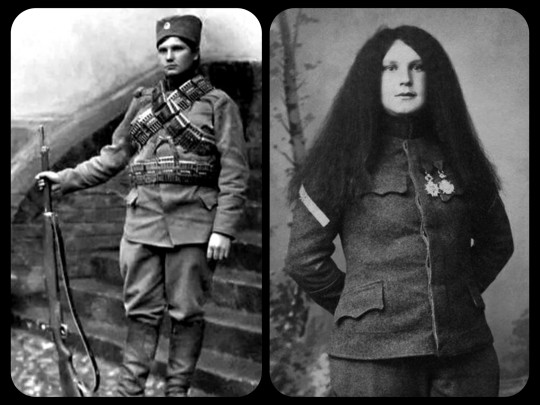
This is a total rewrite of a post that I did last year, with much more detailed information, more photos, and some additional sources.
Milunka Savić is regarded as the most decorated female combatant in history. She fought for the Serbian Army during both of the Balkan Wars, before returning to the battlefield again during WWI. Savić was wounded in battle on 9 separate occasions and survived the Serbian Great Retreat, making the perilous journey across the mountains of Montenegro and Albania through the dead of winter with a serious head injury.
Her military career began during the First Balkan War in 1912, when her younger brother was called up to serve in the Serbian army, and she decided that she would covertly take his place. She cut her hair, wore men's clothing, and presented herself as her brother.
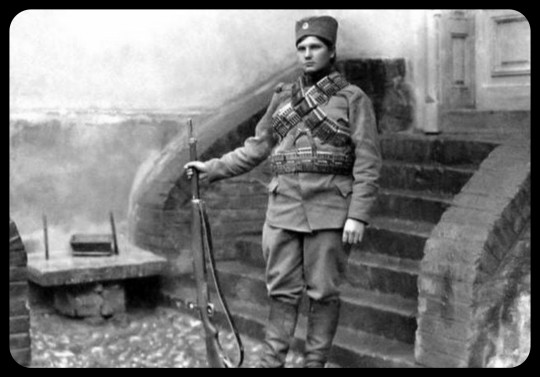
The First Balkan War, 1912: Milunka Savić as a young soldier during the First Balkan War, shortly after joining the Serbian army
She was able to hide her true identity for quite some time. Her skills as a soldier quickly became evident as the war progressed, and she earned her first medal/promotion during the Battle of Bregalnica in 1913. Unfortunately, she was hit by shrapnel from a Bulgarian grenade during her tenth deployment, causing injuries to her chest and abdomen, and those wounds (along with the subsequent medical treatment) ultimately led to the discovery that she had lied about her identity.
In recognition of her accomplishments on the battlefield, her commanding officer decided not to punish her for the initial deception, but informed her that she would not be allowed to return to combat -- as a woman, she could only be transferred to the nursing division instead.
As the story goes:
Savić was called before her commanding officer. They didn't want to punish her, because she had proven a valuable and highly competent soldier, and the military deployment that had resulted in her [sex] being revealed had been her tenth; but neither was it suitable for a young woman to serve in combat. She was offered a transfer to the Nursing division. Savić stood at attention and insisted that she only wanted to fight for her country as a combatant.
The officer said he'd think it over and give her his answer the next day. Still standing at attention, Savić responded, "I will wait." It is said he only made her stand an hour before agreeing to send her back to the infantry.
Savić was able to serve in a combat role throughout the remainder of the Balkan Wars.
The Second Balkan War finally came to an end in 1913, but that peace was short-lived, as World War I erupted just a year later. Savić returned to the military once more, serving in the elite "Iron Regiment" of the Serbian army.
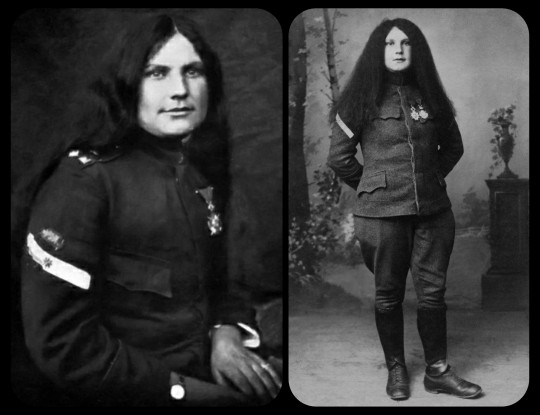
World War I, c.1915-1916: Savić was no longer forced to hide her identity when she returned to battle during WWI, and these images show her posing in uniform with her hair grown out
Savić received the Serbian Karađorđe Star with Swords medal on two separate occasions during WWI; the second medal was given to her after the Battle of Crna Bend in 1916, where she was credited with single-handedly capturing 23 Bulgarian soldiers. She received several other medals throughout the course of her career, including the French Legion of Honor (twice), the French Croix de Guerre, the Russian Cross of St. George, the British Medal of the Most Distinguished Order of St. Michael, and the Serbian Miloš Obilić.
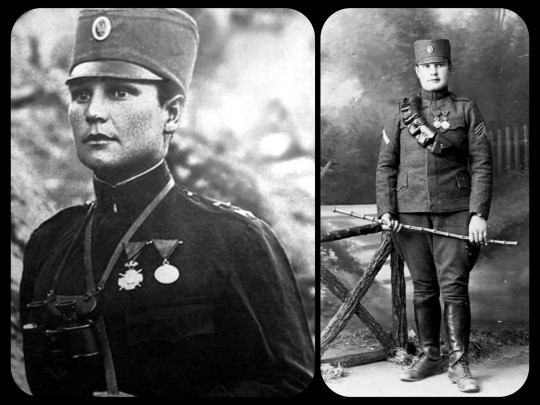
WWI, c.1915-1916: Milunka Savić as a Corporal in the Iron Regiment
She suffered a serious head injury while fighting along the Macedonian front, and she was still gravely wounded when Austro-Hungarian, German, and Bulgarian forces gained control of Serbia in the winter of 1915. The Serbian army was then ordered to make a full retreat from Serbia; Savić and her fellow soldiers, along with the Serbian government and more than 200,000 civilians, were all forced to flee through the mountains of Montenegro and Albania in the dead of winter, hoping to reach Allied forces along the Adriatic Coast -- a perilous journey that would later be known as the Serbian Great Retreat (or the Albanian Golgotha). Roughly 400,000 people embarked on this journey, and less than 180,000 of them survived, eventually reaching the Allied ships along the Adriatic coast.
Despite her injuries, Milunka Savić was among the survivors. She was sent to an infirmary, where she spent several months recovering from her injuries, before she returned to the battlefield alongside Allied forces.
At the end of the war, the French government offered to provide Savić with a full pension and living accommodations in France, in recognition of her actions while serving alongside the French military during WWI. She ultimately declined the offer and chose to retire back in Serbia instead, where she and her husband settled down to raise their daughter and three other girls that Milunka had adopted. The couple would later separate, however, and Milunka was left to raise her children as a single mother, working at a local bank to make ends meet.
In 1941, Serbia (which was then part of Yugoslavia) fell under Nazi occupation. During this period, Savić was involved in providing medical support to local partisans and anti-fascists who had resisted the Nazi occupation. She was eventually arrested by German officers; there are differing accounts of the events leading up to her arrest, with some sources suggesting that she was arrested as a result of her involvement with the local partisans and other anti-fascist elements, while other sources claim that she was arrested after she offended several Nazi officials by openly refusing to attend a formal banquet that was being held in honor of the German military campaign. In any case, she was imprisoned at the infamous Baljinca Concentration Camp for ten months before finally being released.
She faced other forms of hardship in the aftermath of WWII, as she struggled to support herself and her children. She worked several low-paying jobs over the years, while living in a dilapidated, decaying house in Belgrade. Her name (and her long list of accomplishments) had largely faded into obscurity by then.
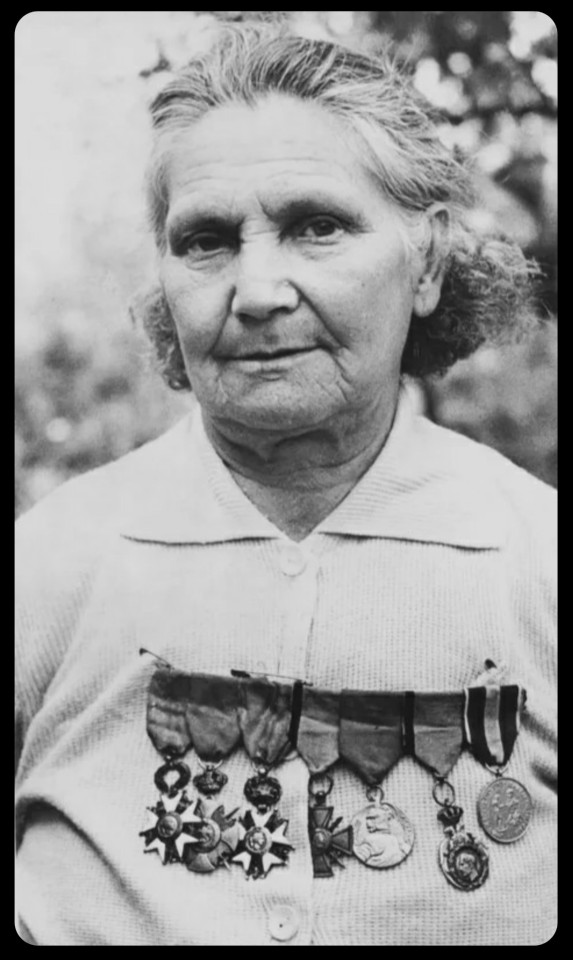
Serbia, 1972: Milunka Savić proudly displaying some of her medals in 1972, when her story became more widely known
It wasn't until the early 1970s that her involvement with the military finally began to receive more widespread attention, both in Serbia and abroad. Following the 1972 publication of an article that told her story, her local community in Belgrade quickly rallied to provide her with newer, more suitable living arrangements.
Sadly, she passed away within just a year of the article's publication.
In 2013, Milunka Savić's remains were relocated from the small mausoleum where they had been interred since 1973, and she was reburied in Belgrade's "Alley of the Greats," where some of the most well-known and most widely respected Serbians are laid to rest.
Sources & More Info:
Research Gate: Milunka Savić: the Forgotten Heroine of Serbia
Girl Museum: Milunka Savić
Law and Politics: The Position of Women in the Serbian Army
Medium: The Fearless Woman-Bomber Who Died Proud, Broke, and Forgotten
Wikipedia: Milunka Savić
Mental Floss: The Serbian "Great Retreat" Begins (WWI Centennial)
#history#Milunka Savić#women in history#serbia#women in the military#balkans#military history#wwii#wwi#yugoslavia#milunka savic#challenging gender norms#feminism#femininity#serbian history#women's liberation#women in war#real-life mulan
134 notes
·
View notes
Text
Hungarian Prime Minister Viktor Orban, the only EU leader to openly back Donald Trump in his bid to reclaim the White House, was unsurprisingly among the first to congratulate the former president on Wednesday morning, even before the final results were in and rival Kamala Harris had conceded.
“The biggest comeback in US political history! Congratulations to President @realDonaldTrump on his enormous win. A much needed victory for the World!” Orban rejoiced on X (formerly Twitter).
Orban, who will be hosting European leaders in Budapest later this week, was swiftly joined by other illiberal leaders and fellow populists in Central and Southeast Europe, likewise unable to contain their glee at the return of Trump, who by midmorning Europe time had gained 266 electoral votes — just four shy from the 270 he needs to be elected the 47th US president.
Another close ally of Trump in Central Europe, Polish President Andrzej Duda, who met the former president in New York earlier this year, posted excitedly, complete with emojis: “Congratulations, Mr. President @realDonaldTrump! You made it happen! 👏👏👏🇵🇱🤝🇺🇸”.
In the Czech Republic, the former prime minister and Trump admirer Andrej Babis posted on X: “Sensational comeback @realDonaldTrump! He wasn’t stopped by an assassination attempt, nor by politically motivated lawsuits, nor by a systematic smear campaign in the media. American citizens have made it clear who they want as US President. I am confident that his victory will bring prosperity to the United States and peace to the world.”
More subdued comments came from Prime Minister Petr Fiala, who Babis is looking to oust in 2025, also on X: “Congratulations to Donald Trump on winning the presidential election. Our shared goal is to ensure that the relations between our countries remain at the highest level, despite changes in administration, and that we continue to develop them for the benefit of our citizens.”
Populist Slovak prime minister, Robert Fico, is currently on a state visit to China, though his ally, President Peter Pellegrini, offered his congratulations to Donald Trump on X. “I wish you and the American people all the success. Slovakia remains to be a strong and reliable Ally on NATO’s tested Eastern Flank living up to our shared commitments. I sincerely wish for a continuation of our good cooperation. Let’s make the transatlantic bond great again.”
Serbian President Aleksandar Vucic, who visited the White House during Trump’s first term in office that ended in 2020, welcomed Trump’s win on X. “Congratulations to Donald Trump on his victory. Together we face the serious challenges ahead. Serbia is committed to cooperation with the USA on stability, prosperity and peace,” Vucic wrote.
Turkey’s strongman leader, President Recep Tayyip Erdogan, said he wanted to congratulate his “great friend” Trump on his victory.
“In this new period that will begin with the election of the American people, I hope that Turkey-US relations will strengthen, that regional and global crises and wars, especially the Palestinian issue and the Russia-Ukraine war, will come to an end; I believe that more efforts will be made for a more just world,” Erdogan wrote on X.
The first to hail Trump’s win from Bosnia and Herzegovina was, unsurprisingly, the president of the Serb-dominated Republika Srpska entity, Milorad Dodik. “One of [the] most important electoral wins in recent history of the USA but the World as well! Congratulations, Donald Trump, 47th President of the United States of America!” Dodik wrote on his official X profile.
Late last year Dodik said that a victory for Trump would mean a “better geopolitical situation for Republika Srpska”, claiming that he regretted not declaring his entity’s independence from Bosnia and Herzegovina during Trump’s 2016-2020 presidency.
North Macedonia’s conservative prime minister, Hristijan Mickoski, sent his “heartfelt congratulations” to Trump on Wednesday morning. “This victory is a confirmation of the deep faith of the American people in the principles of freedom and democracy,” Mickoski, whose conservative, right-wing government came to power earlier this year, wrote on Facebook.
Mickoski and his cabinet are not among European leaders who fear a second Trump term could wreak havoc with transatlantic and international relations. His ruling VMRO-DPMNE party nurtures close ties with one of the biggest Trump endorsers on the continent, Hungary’s Orban, and over the summer Mickoski’s series of meetings with close Trump associates made his preference even more obvious.
“We look forward to further deepening our strong partnership and cooperation,” Mickoski added.
Warm words from the Balkans
The president of Montenegro, Jakov Milatovic, congratulated Trump on his victory. “Montenegro and the USA are friends and steadfast partners, united by shared goals and values, focused on advancing democracy, security, stability, and freedom. As NATO allies, we look forward to working very closely with Your administration on strengthening our friendship and deepening cooperation,” Milatovic wrote on X.
Montenegro’s first congratulatory message came earlier from the president of the parliament and leader of the pro-Serbian NOVA party Andrija Mandic. “I am sure that together we will build bridges of cooperation and preserve peace and stability in the Western Balkans,” Mandic wrote on X.
From Kosovo, which has deep ties with the US since the 1998-99 war, President Vjosa Osmani also congratulated Trump on his White House comeback.
“The US remains Kosovo’s steadfast partner and indispensable ally. I look forward to working with the new administration to further deepen our unique bond and strategic alliance,” Osmani said on X.
A similar message came from Croatian Prime Minister Andrej Plenkovic. “Congratulations on a convincing victory and a second presidential term,” Plenkovic wrote on X. “I look forward to our cooperation and further progress in Croatian-American relations.”
Plenkovic’s domestic political rival, President Zoran Milanovic, hailed “the will of the majority of voters” in choosing Trump. He wrote on Facebook: “Since Croatian independence, the USA has been a partner and friend, I am convinced that this will remain the choice of the new president”.
Albanian Prime Minister Edi Rama was also effusive in his congratulations: “I look forward to the great privilege of working with the 47th President to further enhance our partnership for peace, prosperity and further progress,” Rama wrote on X.
In Bulgaria, Boyko Borissov, leader of recent election-winners GERB and former prime minister, posted a photo of himself with Trump on social media, saying: “I’m ready for us to work together, again!”
Bulgarian President Rumen Radev also congratulated the Republican victor: “I am confident that our effective dialogue at the highest level will continue in the interest of the strategic partnership between Bulgaria and the USA,” Radev said.
Opposition party We Continue the Change’s Kiril Petkov described Trump’s comeback as US president as “a serious achievement”, while noting: “Of course, Bulgaria’s fate depends first and foremost on the will of the Bulgarians, but good cooperation with the US is crucial in the positioning of our country amid the changing geopolitical reality.”
In Greece, Prime Minister Kyriakos Mitsotakis added his voice to the congratulatory messages from countries across the region. “Greece looks forward to further deepening the strategic partnership between our two countries and working together on important regional and global issues,” Mitsotakis wrote on X.
25 notes
·
View notes
Text
THIS DAY IN GAY HISTORY
based on: The White Crane Institute's 'Gay Wisdom', Gay Birthdays, Gay For Today, Famous GLBT, glbt-Gay Encylopedia, Today in Gay History, Wikipedia, and more … January 11


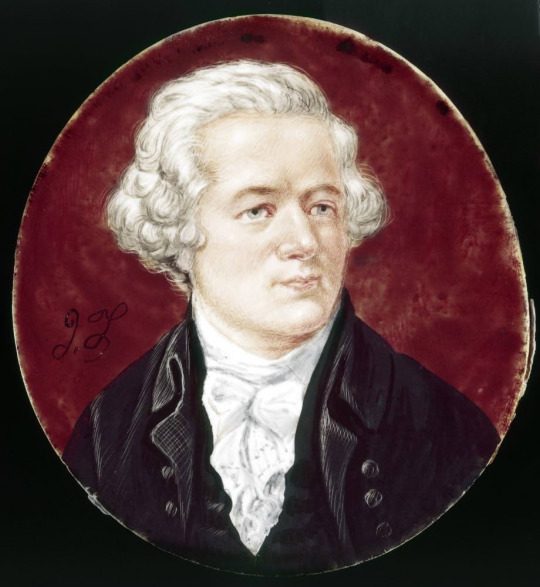
1755 – Alexander Hamilton, 1st United States Secretary of the Treasury (d.1804); One had to wonder what the current occupants of the White House would think if they knew of the ruckus caused a couple of centuries ago by Alexander Hamilton and George Washington, the American patriots who became the first secretary of the treasury and president, respectively. George, whom everyone knows had no children of his own, surrounded himself with a circle of young male revolutionaries who he called his "family." Among his favorites were John Laurens, who once fought a duel to defend George's honor sullied by some cad now lost to history; and Alexander Hamilton. George was thought by his enemies to be a bit soft on the boys and was suspected over being overly fond of young Hamilton in particular.
While in Washington's service Hamilton befriended a group of other young officers, with one of whom, John Laurens of South Carolina, he had a particularly close relationship. When the two were apart on separate assignments, they exchanged affectionate letters. In September 1779, gently chiding Laurens for not corresponding as often as he would have liked, Hamilton wrote, "like a jealous lover, when I thought you slighted my caresses, my affection was alarmed and my vanity piqued."
Between 1779 and 1782, Hamilton and Laurens exchanged a series of love letters, reprinted in Jonathan Katz's Gay American History, in which Laurens addressed Hamilton as "'My Dear' and offered flowery protestations of undying affection, to which Hamilton responded with the touching declaration: "'I love you'." To this day the letters are explained away on the grounds that 18th century men "were classical scholars whose thoughts and actions were colored by the grandeur of antiquity."
Despite the prestige of his appointment on Washington's staff, Hamilton wished to serve in combat like—and perhaps with—his friend Laurens. Using the pretext of a minor disagreement with the general, Hamilton requested and received a transfer in February 1781. The incident left no hard feelings on either side.
Hamilton and Laurens participated in several military campaigns together later that year but were again separated on August 15, 1782, when Hamilton wrote to his friend, addressing him as "My Dear Laurens." Looking beyond the successful conclusion of the war, Hamilton suggested that both of them should be members of the congress of the new country. "We have fought side by side to make America free, let us hand in hand struggle to make her happy," he wrote in a letter ending, "Yours forever."
It is doubtful that Laurens ever read this letter, for he was killed in a skirmish on August 27. Upon hearing of his friend's death from Major General Nathanael Greene, Hamilton wrote back that he felt "the deepest affliction at the news," adding, "I feel the loss of a friend I truly and most tenderly loved."

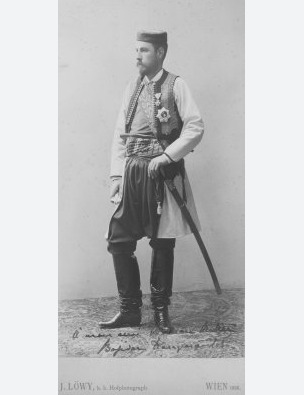
Файл:Bojidar Karageorgevitch — Википедия
1868 – Prince Bojidar Karageorgevitch (d.1908), Serbian artist and writer on art, was a member of the Serbian House of Karaorđević. He was a world traveller. He gave singing and drawing lessons and later earned his living as an art critic and translator. He was a contributor to the Encyclopædia Britannica, Figaro, La Revue de Paris, Revue des Revues, Magazine of Art, and other publications.
Prince Bojidar lived in France for most of his life as this family were in exile. Bojidar travelled a lot and went on a number of trips around the world. He served in the French Army and fought in the French campaign at Tonking and was decorated with the Cross of the Legion of Honour. To earn a living he gave singing and drawing lessons before becoming a translator and journalist
During one of his trips abroad, he travelled extensively around India, visiting thirty eight cities. He wrote a book about his experiences called Enchanted India in which he offered an account of the Indian people, their religious rites, and other ceremonies.
He was drawn to the cabarets of Montmarte, the haunt of artists, writers, poets, philosophers. It was there he met and befriended French stage actress Sarah Bernhardt, pioneer of modern dance Loïe Fuller, French poet, novelist and noted orientalist Judith Gautier, Suzanne Meyer-Zundel, Austrian composer Hugo Wolf, painter and illustrator Henri de Toulouse-Lautrec, and founder of the Ballets Russes Sergei Diaghilev.
His lover was painter Jules Bastien-Lepage, fourteen years his senior, who predeceased him when Prince Bojidar was only 22 years old. The artist, long ailing, had tried in vain to re-establish his health in Algiers. He died in Paris in 1884. Prince Bojidar, was with him at the end and wrote,
"At last he was unable to work anymore; and he died on the 10th of December, 1884, breathing his last in my arms. At his grave's head his mother and brother lovingly planted an apple-tree, which every spring showers down its wealth of pearly petals over the last resting-place of the great master whose loss we all mourn."

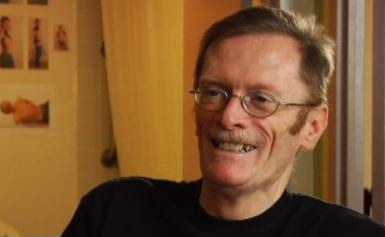
1950 – Rick Bébout is best known for his role in The Body Politic collective in the 1970s and '80s, and for his writings then and since on gay life in Toronto.
One of thousands who had fled to Canada from the United States during the Vietnam War, in 1977 Bébout joined a small group of Toronto lesbian and gay activists who were publishing The Body Politic, a 'gay liberation journal' that had soared to prominence both in Canada and abroad.
Particularly interested in design, he brought the resource-poor publication to an astonishing level of graphic sophistication, while also contributing to its unique voice by writing in its pages.
But his interests extended well beyond sexual politics. Like many other refugees who have settled in Toronto, he was passionate about the city that had embraced him, editing in 1972 The Open Gate: Toronto Union Station, a book that helped prevent the destruction of the iconic building.
Despite his interest in mass politics, he was intensely private and writing was the medium in which he conducted much of his life, particularly in his later years. Notably, he carried on a decades-long correspondence with novelist Jane Rule. (Their letters are being prepared for publication by a US scholar.)
Living with HIV since the mid-1980s, Rick suffered an apparent stroke on June 4, 2009, and died on June 10, 2009, of HIV-related illnesses.


1962 – Today's the birthday of Welsh politician Chris Bryant. Born in Cardiff, Wales. He studied English at Oxford University and theology at Rippon College, Cuddesdon.
Bryant is openly gay, but he was ridiculed in the press when he was discovered to have a Gaydar profile featuring pictures of him wearing only underpants, whilst an MP. In an interview with Attitiude magazine he later described the incident as 'very, very, very, very unpleasant ... I didn't sleep much for about three months.'

Chris Bryant's "Gaydar" picture.
He later appeared looking very buff in swimming trunks at a parlimanetary swimming fundraiser.
In early 2010 Bryant 'married' his partner Jared Cranney in the first civil partnership to be held in the Houses of Parliament.

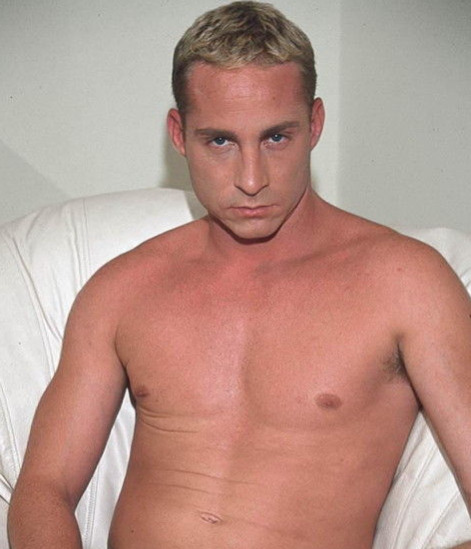
1972 – Chad Donovan is an American performer and director of gay pornographic films. He has won numerous awards as a performer and director, and is a member of the GayVN Awards Hall of Fame and the Grabby Awards Hall of Fame.
Donovan was born into a Southern Baptist family. His rigid religious background and sexual precocity led to experimentation at an early age. "My first experience with a guy was about eight, just playing around and fingering buttholes. We probably didn't even get hard." Donovan's large endowment prompted teasing from his classmates as he reached puberty. "Through high school I had a difficult time because I had to change clothes for gym and stuff. I nearly failed gym class because I didn't want to change clothes. I got made fun of. Plus, not to mention, I hit puberty at ten. So all these little boys were bald as a peacock and here I am, full out baby's arm holding an apple."
Donovan was introduced to the gay pornographic industry by performers Chase Hunter and Tony DeAngelo. They worked as strippers at a 1470 West, a gay bar in Dayton, Ohio where Donovan was bartending. "We were kind of fucking around, having threeways occasionally. They took pictures of me, sent pictures all around," he recalls. Gay adult studios Catalina Video and Falcon Studios showed interest, and Donovan chose to work for Falcon. He was eighteen years old.
Donovan earned a $2,000 scene rate for his first movie. "When you're a kid living in Ohio, that's a lot of money. And a trip to San Francisco for three days. I did the one scene and two photo layouts. It was fantastic. What more could you ask for?" He filmed the scene with Hunter Scott and Anthony Moore. The scene was released by Falcon in 1994 in the film "Workin' Stiff." Donovan went on to film roughly 50 titles as a performer over the next decade.
In 2001, Bob East of Men of Odyssey broached the idea of directing. "He asked me if I'd be interested in directing. He said I seemed to have a good knack for finding talent, I've been in the industry long enough, why don't I try putting a movie together? So I did." That film was titled "Movin' On," and it was during production that he met and began a relationship with cast member Antonio Madiera, which continues to this day. "I had no intention of getting a boyfriend out of it. I hired the kid, I really liked the way he looked, he performed like a champ, and every time I looked down—when I wasn't even shooting him, I'd be shooting other boys in a scene—he'd be looking up at me with these puppydog eyes. I just couldn't resist."
Donovan's final onscreen sexual performances (as of December 2007) were in 2004. One of those films, "Studs 'N Pups" for MSR Videos, was the first time he and boyfriend Madiera performed together. Madiera continues to act occasionally, usually in films that Donovan directs. In 2007, Donovan helmed Basic Plumbing 3 for Falcon Studios; the film starred Chase Hunter and brought them back together 16 years after Hunter introduced Donovan to the industry. Although essentially retired as a sexual performer, Donovan occasionally appears in nonsexual roles. His early roles remain in circulation as they are continually repackaged into compilation tapes.

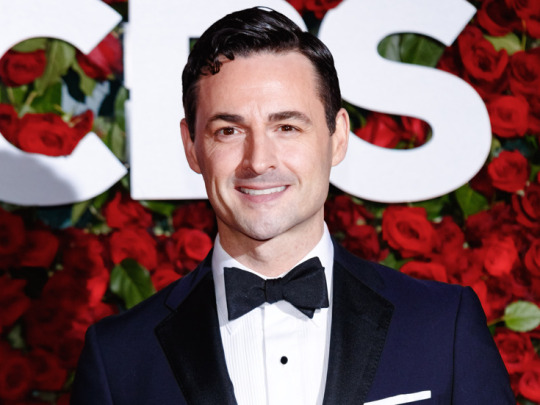
1974 – Max von Essen is an American stage and screen actor, and vocalist.
Raised on Long Island, von Essen is a graduate of South Side High School in Rockville Centre, New York. He attended the University of North Carolina at Chapel Hill, and after graduation toured with Liza Minnelli. He is a member of the Von Essen family, who are part of the German and Swedish nobility. A son of Rita and Thomas Von Essen, who was the New York City Fire Commissioner during the 9/11 terrorist attacks on the World Trade Center, he is the youngest of four children. He is openly gay.
He toured Europe in West Side Story and was a cast member of the U.S. national tour of Chicago. He made his Broadway debut in Jesus Christ Superstar in 2000 as Disciple and Jesus of Nazareth understudy. He appeared in Les Misérables on Broadway as the replacement for Fauchelevent and other roles, and starred in Dance of the Vampires alongside Michael Crawford in 2002. He played the role of student revolutionary leader Enjolras (replacement) in the Les Misérables Broadway revival in 2006 at the Broadhurst Theater.
In 2006, he was a soloist at the biggest Andrew Lloyd Webber musical gala to date, held in Tallinn, Estonia. He performed in the national tour of Xanadu as "Sonny" in 2008[8] and in the Roundabout Theater Company Off-Broadway production of Maury Yeston's Death Takes a Holiday at the Laura Pels Theatre in 2011. In 2015, von Essen played the role of Parisian aristocrat Henri in the Broadway production of An American in Paris, for which he received a Tony Award for Best Featured Actor in a Musical nomination.
Max von Essen is now a star of the off-Broadway play “Yours Unfaithfully,” and lives with his partner, Daniel Rowan, in a Hell’s Kitchen duplex.

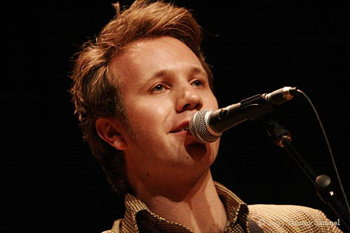
Dylan Rice at the OUT Music Awards
1976 – Today is also the birthday of American singer Dylan Rice. He graduated from Northwestern University in 1998 (where he studied poetry) and now lives in Chicago. In 2004 he released an album called Wandering Eyes.
In July 2006, Dylan, who is openly gay, performed his stadium-rock anthem "The Faces of Victory" for 20,000 people at the Gay Games Closing Ceremonies at Wrigley Field in Chicago, joined onstage by Styx bassist Chuck Panozzo, and backed by a chorus of Chicago LGBT rockers. Written especially for the Gay Games, the song was also recorded in the studio with Panozzo, released as a single, and was highlighted in the official Gay Games VII commemorative DVD in December 2006.
For more information about Rice, visit his website at www.dylanrice.com Under the "Music" tab you can even download some of his songs.

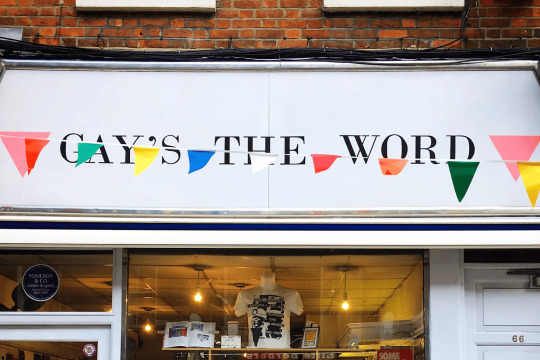
1984 – The Wall Street Journal allows staff writers to now use the word "gay" as a synonym for "homosexual" in article and headlines.

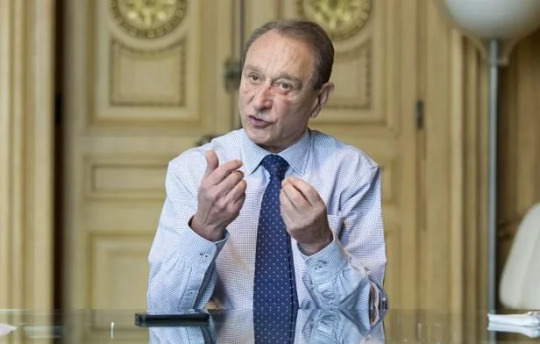
2008 – It was reported on this date that the Socialist mayor of Paris, Bertrand Delanoë, had been given increased police protection after US security services informed their French counterparts that he might be attacked by terrorists. While monitoring internet traffic related to Al-Qaeda the CIA discovered that Delanoë was listed as a target. As mayor of France's biggest city he is the most prominent gay politician in the country.


16 notes
·
View notes
Text

Serbian funeral during the First World War
French vintage postcard
#postkaart#carte postale#briefkaart#french#funeral#old#war#sepia#postkarte#vintage#postal#photography#serbian#the first world war french#world#ephemera#postcard#tarjeta#photo#ansichtskarte#historic
3 notes
·
View notes
Note
What do you think about the murders of women and children? These murders are happening one after the other in my country and it's on the agenda right now. However, some protesters accuse the producers of gory content (body horror necrophobic art, especially female, body horror necrophobic art, and so on) of murder and encouraging it. I also consume this kind of content, and although I took a break because I was affected by this unfortunate brutal murder of a woman, I am someone who consumes and draws such content, and as someone who never wants and defends these things to happen in reality, I wonder if I am encouraging and legitimizing them even if they are fictional art. I hope I was able to explain what I wanted to explain, I wanted to ask because I was curious about your opinion on this issue.
first of all, fuck israel, fuck colonisers, fuck zionists, and a hearty, free palestine
secondly, any effort to censor violence in art (yes, even when inflicted on women) is fascist effort.
when director meir zarchi witnessed an assault on a woman, he called the police, stayed with her on the drive to the hospital, and sat throughout all police questioning. he was so angry about the experience, and what little support is given to rape victims, he went on to make i spit on your grave.
when director pier paolo pasolini lived through the second world war, he was so disgusted by the fascism in his country that he adapted the marquis de sade and made salo, or the 120 days of sodom.
in a protest against his country's film industry "appealing" to EU film funding, srđan spasojević made a serbian film. in response to american soldiers torturing hostages overseas, eli roth made hostel (but also fuck him for being a zionist piece of shit now. super ironic).
horror is political. horror is reactionary. horror is important.
i never want the things i depict, or i enjoy in fiction, to happen in real life. i will never fault someone who doesn't want to interact with upsetting themes (especially if they hit close to home).
but any movement made to remove those themes from art is a fascist movement.
end of statement. thank you for your question and for sharing your story.
26 notes
·
View notes
Text






The leading Scottish suffragette, Evelina Haverfield, was born at Inverlochy Castle on August 9th 1867.
Evelina’s birth is recorded as ‘Honourable Evilena Scarlett’, she took the name Haverfield from her husband. Her childhood was divided between London and the Inverlochy estate. In 1880 she went to school in Dusseldorf, Germany, after which she married Major Henry Haverfield at the age of 19., who was 20 years her senior. The marriage is said to have been a happy one they had two sons together, The Major however died in 1896. Evelina married again two years later, a another military man, Major John Blaguy. This was not a happy union and after some time they drifted apart. The rest of her life was informed by devotion to a cause.
She became an enthusiastic supporter of the suffragette movement and was arrested during suffragette demonstrations in London for hitting an escorting police officer. Her only regret was not hitting him hard enough, promising to bring a revolver next time. During that heady time she met Vera Holme. Their companionship was to last the rest of her days.
At the outbreak of the First World War the suffragettes supported the war effort by founding a Women’s Voluntary Emergency Corps and a Women’s Voluntary Reserve Ambulance Corps. Evelina became commandant in chief of the latter, looking, it was said, every inch a soldier in her khaki uniform, although she later left after a disagreement of an undisclosed nature.
Evelina joined the Scottish Women’s Hospitals and devoted the next two years to overseas service with them. She served in Serbia with Elsie Inglis, as a hospital administrator and was part of a small group taken prisoner when the armies of the Central Powers overran Serbia in October and November 1915.
Under appalling conditions of poverty and military oppression, Evelina and those with her, struggled heroically through the winter to provide food and basic care for their wounded Serbian patients and some of the local civilian population. In the spring of 1916, Evelina and the other 'Scottish Women’ were released through the International Red Cross and returned to England.
In August 1916 Evelina went to Romania in charge of 18 ambulance and transport vehicles as part of two units of the Scottish Women’s Hospitals. These units were in support of Serbian soldiers fighting on the eastern Allied front. The stronger enemy invading armies drove the Russian, Romanian, and Serbian defenders out of southern Romania and north of the Danube river delta.
During this two-month retreat by the Allied forces, Evelina and the transport drivers were working non-stop under constant enemy fire, in desperate situations, while rescuing wounded soldiers and driving them to safety.
By early 1917, with the fighting on the eastern front over, and unable to return to Serbia because of the enemy occupation there, Evelina returned to England, where she remained until after the Armistice of November 1918. In England she raised money for clothing and canteens for Serbian soldiers, gave public speeches on behalf of Serbian relief, and helped to found a Serbian Red Cross Society in Britain.
After the Armistice she returned to Serbia to supervise the distribution of much needed food, clothing, and medical supplies. When this was done, in 1919, she made plans to found a home for Serbian war orphans in a Serbian mountain village. It was there, in Baijna Bashta, that she contracted pneumonia, probably brought on by overwork and fatigue, and died prematurely at the age of 52, revered and honoured by the Serbs for her five years of humanitarian work on their behalf. The Serbs issued a stamp commemorating this remarkable women in 2015, a woman few Scots have even heard of…….
Buried in Serbia today, Evelina’s gravestone reads:
‘Hear lies the body of the honourable Evelina Haverfield youngest daughter of William Scarlett 3rd Baron Abinger and of Helen ne Magruder his wife of Inverloky Castle Fort William Scotland who finished her work in Bajina Bashta March 21st 1920 through the war 1914-1920 She worked for the Serbian people with untiring zeal. A straight fighter as traight rider and a most loyal friend. R.I.P’
In 2015 Evalina was one of five Scottish women and one English women, who worked as doctors, nurses and drivers honoured on a series of stamps in Serbia, the others were Dr Elsie Inglis a campaigner for women's suffrage and the founder of the Scottish Women Hospitals in Serbia. Dr Inglis was one of the first female graduates at the University of Edinburgh.
Dr Elizabeth Ross, one of the first women to obtain a medical degree at the University of Glasgow. She travelled to Serbia as a volunteer and tragically passed away during the typhoid epidemic in 1915.
Dr Katherine MacPhail OBE, involved in humanitarian work in Serbia throughout WW1. She is remembered for opening the first paediatric ward in Belgrade in 1921.
Dr Isabel Emslie Galloway Hutton who joined the Scottish Women Hospitals as a volunteer in 1915 after she was turned away by the War Office in London. She served in France, Greece and Serbia until 1920.
The sixth was English woman, Captain Flora Sandes, who was the only known British female to bear arms during WW1.
This may have been seen as a great adventure for many, but as with all wars there was a price to pay, some of the women ended in desperate tragedy. A total of 21 died in Serbia, many after falling ill with suspected typhus.
15 notes
·
View notes
Text
professional help, c31. Four or five.

simon riley x original character.
trigger warnings: violence, sexual assault, mentions of rape, trauma, sexual themes, swearing, use of alcohol and drugs, EDs and death.
song to listen to when reading this: Lo que puede, puede. Ca7riel, Paco Amoroso.
abstract: Simon here. You're following the story alright? Good, cause I'm not. Getting more and more confusing and everywhere I go, she's following. I can't get her to stop invading my space, it's getting repetitive.
'Oh yeah?' What a stupid fucking thing to say, Simon get it together. She looked at him, beautiful, tired siren eyes, beautiful long lashes, sad gaze. She nodded. She knew his family was dead, she knew cause he told her. How they died, she didn't know. Addiction? Something else? 'Yes, 'twas a…', lie Alba, '…drunk driver'. He nodded, his eyes still on her. He felt sorry. Why didn't she talk about her family more, why did she move away? Why was she so far from home? 'It's tough.' That's all he could say. I lost all my family, he could have said. But how do you explain something like that, how do you even say it out loud? How can someone like her understand what happened to him, how can someone like her comprehend. What happened to him was out of this world, his family, death, the bodies, what he had been through. It wasn't the same, sure losing a family member was awful, but it wasn't the same. They weren't the same.
He got up from the chair, taking a step away from her. He couldn't even look at her, he mumbled something about not staying at the base at night. And he was gone. She wasn't mad, she wasn't offended. She cursed herself for saying that thing about her brother, wanting him to feel like he could share parts of his past. It was probably too much, too soon. But still, if he wanted to, he would. Especially after throwing that tantrum at her place on the 24th. Don't expect me to listen to you bitching and moaning about my lifestyle and your brother and not wonder about it.
She went home soon after, she wasn't concentrating on her tasks, she was too tired. A walk with the dog, dinner, a shower. Things were only getting more complicated. She laid in bed trying to put the pieces together, the gentle snoring of the dog in the other room, the wind outside the window. How she was gonna manage to stay on top of things and stay sane, she didn't know. She had a meeting with Price on Thursday, three days after her chat with Simon. Didn't go well. She was sitting with her back straight, hair in a slick bun. She had a skirt on, a turtleneck, big chunky glasses. Her, Roman and Honey were academics in a room full of soldiers and men of war. With their stupid dictionaries and stupid papers, all written in gibberish. Price was mad. Honey, who took control over the situation, was trying to explain their findings to the captain. Behind the three, stood Scotland, Simon and Kyle, along with two other people. Scary stuff, it felt like they were being interrogated. They got new information about the mission. First of all, the Serbian group was talking about transportation. They were talking random numbers, they all suspected drugs. 160 grams per unit, 663 grams per unit. They started wondering which substance they were talking about, since the shipping was intended to reach different countries, and it was going to be pricy. One hundred thousand per unit. Cocaine, meth?
'So you have no idea what we're dealing with?' asked Price.
She was fed up with the captain verbally abusing her and her colleagues, so she spoke, 'You know, they're not talking about shipping tons of heroine like they're talking about football captain', she was raising her shoulders, 'They're discreet.'
'Okay, what are you suggesting we do then, Jude? You guys have made no progress.'
She stopped him again, 'We did, we just told you…' she pointed at Roman's notes in front of her, 'they're shipping single units in separate containers, they're using trucks to make separate shippings, we know it's something expensive…'
She was calm, collected, she was fucking hot as hell. Simon stared at the back of her head as she controlled the room, she was assertive. She was tense, he could see the muscles in the back of her neck. 'You have two days', Price had said. When she got up from the chair she was too mad to even acknowledge him. She turned towards the other two translators, he didn't know who they were. They said something in italian he thought, they all knew italian? They left together. All three.
She didn't even look his way. What, cause she was pissed at Price it meant she was pissed at him as well? What did he do? He thought they could maybe talk, she could share more of what they found... Maybe these two new friends she was working with were taking his place, she didn't need him anymore. He watched her leave the room like they didn't know each other, and he felt a strange pressure on his chest. She didn't look his way, like she didn't care that he was in the room. And she was the only thing he was concentrating on every time they were together so... What a shame.
It all happened so fast, one random Tuesday at 5pm. Honey tapped his hand on the desk three times, she immediately turned around, getting tangled in her headphones. Roman spilled some tea in the attempt of running from his desk to Honey's. 'Shit shit shit', someone whispered. Honey took off his headset, turning up the volume so that everyone could hear. It was a male voice speaking, he was speaking broken English.
'At four, пет, не знам.'
She glanced up at her colleagues. She understood what they said. They said 'four or five'.
'They want job clear and fast, да, добро'. Clear.
Honey was scribbling on a piece of paper, trying to get everything down as the man spoke.
'Read that, да, not many men. како се каже, English… code, secret. Secret.'
He went on for a minute, when he finished they all went back to their stations, at the speed of light. The reason was, if some soldiers went to different rooms to speak about the attack that was just announced they could share thoughts and information, they had to be at the top of their game for the next thirty minutes. She put on her headset, trying to calm the beating of her heart that she thought could explode out of her chest. She heard Serbian, she heard English. Someone said Видим се. See ya, that was the translation. 'Alright…' someone whispered.
'Oh, oh porca troia raga…', that was the clue for Honey and Roman to quickly turn towards her.
Her eyes luminescent, her ears burning, quick fingers typing on the Word document in front of her.
'A job at four or five, don't know the date, they're shipping something to Iran, circa 20thousand maybe more, cocaine and something else, but I'm not sure…' It was Madison, she guessed, referring that information to them. He was whispering into the recording device, speaking quickly so that he could leave that spot without being suspicious. 'Sending you a copy of the paper, gotta go, they have prisoners, poor people, they're all sitting in a room…they're killing them, they want to kill them…' He soon after stepped out of the toilet.
She finishes writing, and got up. She looked at the two other people in the room, just as surprised and shocked as her. Shocked and happy, they finally got something. Shocked at what they just heard, people, prisoners…
'Job at four or five, are they selling drugs?' Roman asked. 'To Iran?' She tried, Honey understood immediately what she was on about. 'No way! Fuck, poor people in a room?' He covered his mouth with his right hand. She had never heard him swear, or lose composure. 'Honey, they're doing something for the Iranian at four or five, they're paying them to do something.' She got up from her chair. Poor people in a room…
'Holy shit…' That was Roman.
'I thought they were gonna attack them, sell the drugs at higher price'
Poor people in a room…
'Hold on, sorry…' Roman got up as well, a piece of paper in his hand. 'What we heard on Sunday, about the shippings. They're selling stupid amounts, look…' He got closer to the others, a paper with translations and calculations in hand. 'They're shipping to loads of countries, nearly 5 pounds, 4 hundred thousand for 5 pounds of what, heroine? Why are these prices so high?'
'Cause they're not talking about drugs. It's the poor people in the room.' She got it.
Her blood went cold. It was true, they had been going on about refrigerated containers, moving trucks that could fit tons and tons of materials inside, too large to go without being checked, too risky to use for a bit of marijuana. They were dealing with larger objects. Pricier material, fewer pieces. They had people to kill… No… They had prisoners, people in a room. The Iranian paid them cause they had the people. She clicked her tongue, shook her head. This was above them, this was… too much. It was the people.
'It's organs. It's organ trafficking.'
'Oi are you even listening?' Ghost turned his head towards the voice on his right, Johnny was walking beside him heading towards the hangar. 'Wot?' He said, an annoyed tone. 'I asked how many?' He wanted his head to explode, he had a migraine, he was tired, Johnny was speaking… 'How many what?' He raised his voice. He had things to do, reports to finish, he had to pack cause he was about to leave, and he didn't even know if he was deployed, they just told him 'in case we need help' and it was fucking stupid, did I mention he was tired? 'How many units per container, why are you not listening?' He rolled his eyes, they were walking towards Kyle. 'They're late cause of a bloody sandstorm', he informed. They had to wait for all the soldiers who were still in Al-Jareena to come back, they would have a meeting with Price and apparently Shepherd was back for a while.
'Where's Thomas?' Johnny asked, Kyle shook his head. 'Couldn't make it again, he still has problems with his back.'
'Ah shit'
'Oi, did you get that email about that human rights convention and what not?' They were walking beside him, they were not shutting up. He craved his bedroom, his childhood bedroom in the UK, he craved silence, he craved warmth of a fireplace and a steak…
'Did you get it L.t.?' I didn't. I don't care. He said no.
'You never answered my question, I was trying to do the math'
'What question?'
'How many units of drugs per container did they say, heroine or cocaine, cause the weight would be different...'
'I don't know, whatever Alba said.'
The ceiling collapsed, the floor crumbled under his feet, his body falling though the abyss of Hell. Blood rushing to his ears. He watched as the two men's faces went from shock to fear. They stopped in their tracks.
'What the fuck?'
'Who the fuck is Alba, mate?'
'How do you know?'
'No way, Jude is Alba?'
'No fucking way, it's her you've been seeing?'
'What do you mean, you're going out with her?'
Before he could register the immense mistake he had made, he heard a voice. A sweet, sincere voice. He heard the voice he normally heard in his dreams, in his mind. The two men were soon forgotten, she was coming his way. 'Hey!' She shouted. She stood in the middle of the hangar, making a few men turn towards her. Her, in all her grace, her dark aura, her aura of power and knowledge. She looked pale, she looked… she was crying? She looked scared. Watching all three soldiers stop and look at her, she signalled them to follow her with a single nod of her head. Come with me, that was the signal. 'All three' She said. They followed like they were some damn dogs.
'Are you out of your mind!?' Price's voice was loud, his hands on his hips. They were inside the listening post room, him, Johnny, Gaz, the captain and the three scientists. 'What?' She raised her voice as well, he had never heard her like this before. 'Literally, what is your problem?' She spoke to the captain, crossing her arms. Price went on for a few minutes scolding the three academics. The accusations and the theories on organ trafficking were serious, and they had always talked about drugs, why were they abandoning that route? 'Because it makes the most sense, captain.' Tried Honey. He showed Price the list of all the weights and measurements they had heard about, which, as they discovered, fit quite perfectly the average weight of kidneys, lungs and hearts. 'That explains the refrigerated containers', she chirped in. 'And the prices', Soap, unexpectedly, gave her a nod of credit. 'And the poor people', finished Honey.
They explained it wasn't rare for poor people to get into situations such as organ and human trafficking. They could make a lot of money, they were easy to convince, easy to manipulate and desperate. It all started to make even more sense when they found information in Serbian news articles online about people disappearing in the latest few months. They found many individuals started reporting to be victims, or suspect family members to have had illegal surgeries for organ trafficking. 'They said they're receiving a note with a code of some sort', she was standing on Simon's right, near her desk. Her hair was messy and undone on her shoulders, she glanced at the time on her phone from time to time. Have you got somewhere to be? 'Probably containing information on when the shipment might be made, or what to do with the people they're gonna take the organs from'. The room was filled with silence. It was sad, really. They were glad they made the discovery, but overall, not good news. Price crossed his arms, looking down at his feet. It was clearly more than they were expecting. Simon would't take his eyes off Alba. He was proud, he was sad she had to deal with this tremendous job. She looked at him. He gently tilted his head foreword, as to say, you're good. He didn't know why it was so important for him to let her know that he supported her. She gave him a small smile. He felt they were feeling the same emotion somehow.
'Will you be able to translate the code?' asked Price.
'Sure, yes, we'll do everything we can.' Honey.
Price sighed.
'Good work.'
notes: massive chapter, sorry!!!
taglist:
@ghostlythots @sweetfemmefatal @natxpat @chavarriakeren647 @ravenmoore14 @farther-than-pleiades @internallyscreamings @hwromi @atoxicrat @cuti3maddi3 @deafeningkittenblaze @its-celeste @serene-hills @lexidoll12 @poohkie90 @lunatiquess
@warmedbythebody @katzykat @iristhemuse @azkza @keiraslayz @abbyandermine @jennyjencakes @dest-nai @corset-briefs @nutze-kekse @ilytsukiw @b3anspr0ut
@pondsblog @missyouzoe @fallenkitten @bigauthorrascalturkey @bethtay @angelynn-nicole @starluv @stargirlisworld @giyuuslittleslut @impossiblecupcakelight
@rkrivees-blog @ghosts-hoe @kam1snotverysmart @gauky76 @freyjaaasstuff @spicyspicyliving @scottpilgrimvsmyfists @courtney0-0 @shinchanboi @darling006 @my-therapist-hates-me
#ghost cod#simon ghost riley#cod mw2#ghost fanfiction#call of duty#cod fic#cod modern warfare#cod 141#task force 141#tf 141#ghost simon riley#simon riley call of duty#simon riley#ghost mw2#mw2 ghost#ghost#taskforce 141#johnny soap mactavish#john soap mactavish#soap cod#kyle gaz garrick#modern warefare ii#modern warfare#call of duty modern warfare#gaz call of duty#call of duty mw3#ghost call of duty
16 notes
·
View notes
Text
Serbia OC doodle compilation and facts about him!








First concepts (down here) New concepts (above)



So this is my dear Serbia, also known as Zoran Damjanić, so why don't we dive into his personality and some things about him?
DESIGN
He has pale skin with olive undertones, so not WHITE WHITE, but white. He can tan really nicely.
He has either greyish blue eyes OR brown honey eyes (I don't know exactly yet)
He has multiple war scars through his body. One can be found on his face; that goes through his right eye (I believe that's the right side); he also has some of them in his chest, arms, and legs, also on his back.
He has a beard and moustache, but it's not so prominent; I mean, it could be prominent, but he cuts it really close to his face, like a stubble, actually.
His hair is a dark chocolate tone but not so dark, like a really average dark brunette shade. Regarding the hairstyle, oh, that's the complicated part; he has messy hair; it can be said it's similar to a mullet. I believe I'll change it eventually; I'm not keen on mullets.
On his right arm, in the upper part, he has a tattoo of the Serbian Cross.
He uses glasses, specifically the rectangle type.
He has body hair, not so much as in other countries that are basically forests of body hair, but he does have quite some of it.
His body is toned but slim—not a skinny legend; he's fit and looks healthy; regarding height, he is 180 cm, 5 ft and 11 inches, I believe.
He usually wears a shirt with a vest (like the traditional clothing) with a pair of jeans and combat boots, OR a t-shirt with a random insult, jeans, combat boots, and a jacket.
PERSONALITY
Too bold, extremely bold.
Sometimes says the most obscene comments in the worst moments possible.
Extremely patriotic; he loves Serbia, but he's Serbia… So he has an incredible self-love situation, so yes! Self stem.
He is someone who can either be considered fucking crazy or a mad genius.
Serbia is someone really intelligent; seriously, he can be extremely silly, but don't let that fool you; HE IS A GENIUS.
Zoran has a fascination for science, engineering, and... war.
He can be cold, distant, and even mean sometimes.
He loves sarcasm; it's his second language.
He is someone who can either HATE someone or EXTREMELY like them.
He is kind of extroverted; actually, HE IS really extroverted and loud.
He has an accordion called Tajtana; he loves her.
He loves playing sports, and he actually is pretty good at them.
He can get jealous of others and is also kind of protective of the ones he enjoys being around.
He is a certified and proud asshole.
He loves drinking Rakija, when he gets drunk, there are two outcomes: either the happiest man alive, or I have a chair on my hands and I won't hesitate to hit you hard.
He is really stubborn, seriously.
Serbia can be really straightforward; he won't hesitate to say the truth to anyone.
He has the worst dark humour ever, but dark humour that makes you go pale.
He is also someone really nice, of course; he can be a cutie patotie.
RELATIONS
Slovenia (Alenka Krajnc)
Zoran respects Alenka for her organisation and patience, traits he doesn’t often see in his chaotic world.
However, her independence from Yugoslavia left a mark—Zoran still harbours a sense of betrayal, though he rarely expresses it openly.
Their conversations are polite but formal, with occasional sarcasm or subtle jabs. Alenka finds Zoran's bold nature exasperating, while he admires her ability to keep things together, even if he won’t admit it.
They rarely seek each other out but can cooperate if necessary (alcohol MUST be involved).
Croatia (Darko Perković) - brother
Zoran and Darko’s relationship is defined by bitterness and past betrayals.
As siblings, they have an undeniable bond, but it’s buried under layers of resentment.
Arguments frequently escalate quickly, with both being stubborn and unyielding. Darko is just as bold as Zoran, so their conflicts are quite intense (Can lead to physical fights)
Despite their rivalry, there’s a reluctant acknowledgement of their shared history. In rare moments of vulnerability, they might show fleeting signs of brotherly care—but those moments are rare. (And as with Slovenia, alcohol MUST be involved).
Bosnia (Damir Galijašević) - brother
Zoran and Damir have an outright horrible relationship.
The breakup of Yugoslavia amplified existing tensions, leaving both harbouring anger and grudges.
They avoid each other whenever possible, and when forced to interact, the atmosphere is icy, with sharp comments exchanged.
Zoran views Damir as overly sensitive, while Damir finds Zoran overbearing and selfish.
Their conversations often devolve into arguments.
They can be friends and have fun together if alcohol is involved.
Herzegovina (Zlata Hodžić) - sister in law
Zlata and Zoran can’t stand each other.
As Damir’s wife, Zlata sees Zoran as a toxic influence on her husband, and Zoran finds Zlata annoying and meddlesome.
Zoran’s sarcastic humor and blunt remarks only worsen their interactions, and Zlata is equally quick to fire back.
She dislikes how Zoran mocks Damir (even tho Damir mocks Zoran too).
Republika Srpska (Mirko Savić) - son
Mirko is the product of one of Zoran’s adventures, and Zoran genuinely loves him.
He takes great pride in Mirko and is very protective of him, more so than almost anyone else.
They share a lot of similarities—Zoran sees Mirko as a younger, better version of himself and encourages his strengths.
Mirko brings out Zoran’s softer side, and their interactions are full of warmth and humor.
Zoran is surprisingly patient with Mirko, which contrasts with his usual harsh demeanor.
Montenegro (Milica Vujović) ex-wife/ex-girlfriend/girlfriend
Zoran deeply loves Milica and considers her his best friend and closest confidante. However, his infidelity and brash nature have hurt her more than he intended.
Milica is incredibly naive and forgiving, which frustrates Zoran at times because he knows she deserves better. Yet he can’t imagine life without her.
He’s fiercely protective of Milica, sometimes to the point of being controlling.
Their relationship is filled with ups and downs—passionate love tempered by moments of regret and pain.
Despite the flaws, Milica’s unwavering loyalty keeps them together, and Zoran tries (and often fails) to be better for her.
Zoran and Milica's relationship is complex, deeply rooted in history, and layered with passion, jealousy, and a love that has weathered centuries.
They regularly break up and make up, leading to a cycle of constant emotional push and pull.
At times, their arguments escalate to full-blown fights, especially during the Yugoslav wars, but even in the peak of conflict, there’s always a passionate reconciliation afterward.
Zoran is intensely protective of Milica and gets extremely jealous when she talks to others, particularly Croatia or Albania.
Despite his unfaithfulness twice (he had Vojvodina and Republika Srpska with TWO different women), Milica stays by his side, choosing to focus on their deep connection and often forgiving him for his transgressions.
They've been friends since practically ever, and they got married in 1918; they divorced in 2006.
Zoran sometimes visits Milica at 3 am and throws pebbles at her window, then proceeds to play his accordion, trying to win her (it always work)
Vojvodina (Vuk Pavlović) - son
Just as Republika Srpska, Vuk is the result of one of Zoran’s past adventures, and Zoran has a very good relationship with him.
Vuk takes after Zoran in both intelligence and boldness, which makes Zoran proud.
They bond over shared interests like engineering and sports, and Zoran is always encouraging Vuk’s ambitions.
Their relationship is light-hearted and playful, with Zoran regularly jokingly teasing Vuk while still being supportive.
Kosovo (Luljeta KrasniqI)
Zoran and Luljeta’s relationship is deeply antagonistic.
The Kosovo conflict left wounds that haven’t healed, and Zoran is openly hostile toward her, refusing to acknowledge her independence.
Their interactions are marked by sharp words and confrontational attitudes.
Luljeta doesn’t back down, standing firm against Zoran’s arrogance.
Any attempt at diplomacy quickly deteriorates into arguments.
Zoran always mocks her on Facebook.
Albania (Erion Hoxha)
Zoran and Erion are sworn enemies, with a rivalry as intense as it gets.
Their arguments are explosive and often escalate to threats or worse.
Erion’s boldness matches Zoran’s, creating constant friction.
Both are stubborn, and neither will admit fault, fuelling their animosity.
Their interactions are frequently tense and dramatic, filled with insults and challenges.
They avoid each other unless conflict is unavoidable, at which point it’s a powder keg waiting to explode.
They mock each other on Facebook and basically every social media they can.
North Macedonia (Zivka Nikolovska)
Zoran and Zivka share a close and affectionate bond. Their friendship is built on mutual understanding and years of shared history.
Zoran sees Zivka as a younger sibling he genuinely cares for. He’s protective of her and enjoys her company, appreciating her easygoing and supportive nature.
They often team up to tease others or share jokes, with Zoran showing his lighter side when he’s around her.
They love being silly together.
Greece (Leonidas Kostopoulos)
Zoran and Leonidas are as close as brothers without the blood relation. Their friendship is built on shared values, deep respect, and camaraderie.
They have an easy dynamic, often sharing Rakija and philosophical discussions, ranging from history to war to cute girls, of course Zoran talks only about his dear Milica.
Leonidas is one of the few who can calm Zoran down during his aggressive outbursts, while Zoran admires Leonidas’ wisdom and composure.
Their banter is filled with friendly insults and sarcasm, but it’s all in good fun. They’d go to great lengths to help each other.
Bulgaria (Boris Dimitrov)
Zoran and Boris are good friends who share a mutual respect. While they don’t always see eye-to-eye, they enjoy each other’s company and bond over shared cultural similarities.
Boris appreciates Zoran’s boldness, even if it’s overwhelming at times, and Zoran likes Boris’ straightforward attitude.
They have a relaxed dynamic, often exchanging sarcastic remarks but with no malice.
They can end up fighting sometimes over who is the real best friend of Romania.
Romania (Ecaterina Popescu)
Ecaterina and Zoran are incredibly close, their bond rooted in years of friendship. They understand each other’s quirks and flaws, making their friendship unshakable.
Zoran appreciates Ecaterina’s playful and witty personality, while she enjoys his dark humor and protective nature.
They’re partners in crime, often causing chaos together. Zoran is fiercely loyal to her and would defend her without hesitation.
Zoran and Ecaterina have a relationship full trust and emotional support.
Turkey (Önder Mumcu)
Zoran and Önder have a strained relationship, with historical conflicts and clashing personalities creating friction.
While they manage to remain civil in certain settings, the underlying tension is palpable. Zoran is openly distrustful of Önder, seeing him as manipulative and overbearing.
Their interactions are filled with subtle or not-so-subtle jabs, with Zoran rarely missing an opportunity to criticize Turkey’s influence.
He always mocks Turkey's relationship with Nazrin.
Azerbaijan (Nazrin Hasanova)
Zoran views Nazrin with skepticism, seeing her as overly loyal to Turkey and unwilling to stand independently.
Their interactions are polite on the surface but laced with tension. Zoran’s sarcastic remarks often hint at his true feelings, which Nazrin doesn’t appreciate.
Despite the tension, they maintain a thin veneer of civility, though both are quick to snap if provoked.
Cyprus (Androula Christodoulos)
Zoran and Androula share a pleasant, easygoing friendship. They bond over their love of good food, music, and mutual understanding of complex histories.
Androula’s calm and diplomatic nature is a good counterbalance to Zoran’s boldness, and she often manages to soothe his more fiery moods.
They are bost best friends of Greece, so they usually meet when Greece wants to hang out.
Armenia (Gevorg Soghomonyan)
Zoran and Gevorg have a good friendship built on mutual respect and shared experiences. Both have faced hardship, and their bond reflects their ability to empathize with one another.
They often enjoy deep conversations about history, culture, and resilience, with a sprinkling of Zoran’s dark humor to keep things lively.
Zoran admires Gevorg’s strength and determination, while Gevorg finds Zoran’s boldness amusing and occasionally inspiring.
Hungary (Istvan Erdei)
Zoran and Istvan are friendly and get along well, despite some cultural differences. Their friendship is filled with playful teasing and sarcastic humor.
Istvan appreciates Zoran’s straightforwardness, and Zoran respects Istvan’s strength and sense of independence.
They’re the kind of friends who can share a drink and swap stories, with Zoran occasionally poking fun at Hungary’s history, to which Istvan retorts with sharp wit.
Poland (Anastazja Kowalska) - distant cousin
Zoran and Anastazja have a respectful and amiable friendship. Zoran admires her resilience and finds her eccentric personality amusing.
While they don’t always see eye-to-eye, Zoran respects Anastazja’s sense of pride and independence, and she appreciates his intelligence and boldness.
Their conversations are a mix of lighthearted teasing and moments of genuine understanding, creating a solid but casual friendship.
Czechia/Bohemia (Matouš Černý) - distant cousin
Zoran and Matouš share a mutual appreciation for history, culture, and dark humor. They often bond over intellectual discussions and their shared love for music and art.
Matouš finds Zoran’s bold personality entertaining, while Zoran appreciates Matouš’s cleverness and dry wit.
They have an easygoing relationship, often laughing at their shared dark humor while exchanging sarcastic remarks.
Czechia/Moravia (František Novák) - distant cousin
Zoran and František have a laid-back friendship rooted in cultural exchange and mutual respect. František’s practical nature aligns well with Zoran’s genius, making them a good team when working on projects or ideas.
Their conversations are a mix of casual banter and discussions about shared interests like sports, music, or science.
Zoran enjoys František’s grounded personality and considers him a dependable friend.
Slovakia (Viera Lukáčová)
Zoran and Viera have an incredibly close friendship, built on years of camaraderie and mutual understanding.
Viera is one of the few who can keep up with Zoran’s bold personality without getting overwhelmed at all.
They share a playful, teasing dynamic, with Viera often calling Zoran out on his antics while he enjoys making her laugh with his sarcastic humor.
Zoran is protective of Viera, treating her like a younger sister. She, in turn, admires his intelligence and bravery, even if she rolls her eyes at his over-the-top moments.
Russia (Yuri Ivanov)
Zoran and Yuri share a deep, almost familial bond. Zoran sees Yuri as a brother figure and respects his strength, resilience, and influence.
Their friendship is a mix of shared history and mutual understanding, as both have endured hardships that shaped them. They often drink together, with Zoran cracking dark jokes and Yuri laughing in his signature calm yet unsettling way.
Zoran feels comfortable being vulnerable around Yuri, trusting him with secrets he wouldn’t share with others. Yuri, in turn, values Zoran’s loyalty and fiery personality, finding it refreshing.
They’ll defend each other fiercely, and despite occasional disagreements, their bond remains unbreakable.
Belarus (Tatsiana Romachuk)
Zoran and Tatsiana have a strained relationship, constantly vying for Yuri’s attention and approval.
This rivalry fuels a tense dynamic, with both trying to prove who is closer to Russia.
Zoran finds Tatsiana’s cold and possessive nature frustrating, often clashing with her in arguments that range from petty to explosive.
Tatsiana, meanwhile, views Zoran as an annoying rival who doesn’t understand Yuri the way she does.
Despite their rivalry, they share a grudging respect for each other’s determination and loyalty to Yuri, though neither would admit it.
Austria (Francizka Schwarz)
Zoran and Francizka maintain a tense and bitter relationship, with Zoran holding a grudge against her for events during World War I.
He blames her country for causing pain to Serbia and isn’t shy about voicing his disdain.
Their interactions are marked by sarcasm, thinly veiled insults, and occasional heated debates. Francizka, in turn, finds Zoran brash and uncultured, which only fuels his animosity.
Zoran refuses to let go of the past, while Francizka occasionally tries to maintain civility and avoids him most of the time.
#art#aph oc#countryhumans#hetalia#hetalia oc#countryballs#hetaliaoc#humanization#oc#aphoc#aph serbia#TNC Serbia#TNC#TNChronicles#The Nation Chronicles#The Nation Chronicles Serbia#Serbia oc#country personification#country humanization#country oc#hetalia serbia#hws serbia#countryhumans serbia#writing Gracheee#Gracheee art
8 notes
·
View notes
Text
Freefalling From Great Heights - A Discussion & Analysis
Hey guys. So, I lied about getting off socials LOL I really need to go full on film theory here and talk about the fall. I do want to preface though and say that I am not a woman of science (I’m an art girlie), therefore I won’t be able to make any sort of proper calculations. Without further ado, I’m going to break down the whole fall and discuss how Tech could’ve and probably did survive.
First and foremost, I want to go back and take a look at the most clear shot given to viewers of the height between the tram system and the perceived ground level. In this picture, we get a brief glimpse from Wrecker’s POV of how far down it is from the trams.
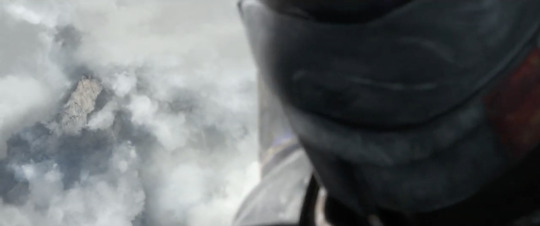
While it looks quite high, considering they are practically in the clouds, it is important to note the amount of foliage this planet has; a vast amount large trees, specifically tall pine trees.

These types of trees are not uncommon in biomes that include bodies of water. Consider the images below.


While it is not definitive, it can be safe to assume that there could have been a stream or body of water below in that valley. However, even if this was not the case, the trees are large enough that they can dampen a fall, even if it is from a great height. This leads me to my next point:
How high of a fall can humans survive?
An NCBI article covers the case of a rock climber who had fallen from a total of 300 feet and survived. Though she suffered many severe injuries, she was able to recover after extensive medical care. According to this article, the way in which a person falls is imperative to survival. In particular, if a person is falling vertically, they can survive an average fall height of 23 feet and 7 inches (7.2 meters) with minor to moderate injury. Survivable injuries have a threshold of around 20-25 feet. Yet the rock climber was able to survive at even greater heights. That being said, according to an article by Arnold & Atkin Trial Lawyers, 20 feet and below can still prove to be fatal. Moreover, fatal falls usually are between 21 and 40 feet. Considering all the information thus far, it would seem that Tech is exceptionally fucked. But stay with me folks, I’m not done cooking yet.
While it is not common, humans have, in fact, survived free falls at extreme heights. Take for example Vesna Vulović, a Serbian flight attendant who holds the Guinness world record for surviving the highest freefall without a parachute: 33,330 feet (10,160 meters). She was in a coma for days and spent several months hospitalized. She suffered a fractured skull, three broken vertebrae, broken legs, broken ribs, and a fractured pelvis, leaving her temporarily paralyzed from the waist down. Despite all of this, she made a nearly complete recovery, only continuing to walk with a limp.
In another case, Nicholas Alkemade, a British tail gunner of the Royal Air Force during World War II, survived a freefall of 18,000 feet (5, 490 meters). His fall was broken by pine trees and a soft snow cover on the ground.
While the first case can be safely considered as a miracle, it's the second case that is interesting. The pilot survived a freefall from a height he should’ve died from. Yet, due to the large trees and the snow on the floor, his fall was cushioned and allowed for him to survive.
Now, taking what we discussed and applying it to the Star Wars universe, the chances of Tech surviving is definitely in our favour. Firstly, we know there is a lot of foliage (bushes, grass, etc.), and there are also massive trees. But we must remember that this isn’t just some random, unprepared person that is falling. This is Tech, a highly skilled, highly intelligent, and well equipped clone trooper. It is also important to mention that he is wearing a helmet and a chest plate, which provides protection to critical body parts. Knowing him, Tech could have very well put his gear to use and used a grappling hook to attach to a tree and create momentum from his fall to swing onto the ground. He could have also gotten into the falling tram and found a way to cushion his fall. But let’s say he does neither of these things (perhaps due to the speed at which he was falling), Tech can still survive if he falls vertically into the pine trees and foliage, which will cushion his fall, just like Nicholas Alkemade and the rock climber, respectively.
Furthermore, based on all that has been discussed and considered, the chances of survival of a freefall from that height, while seemingly impossible, is in fact, possible and likely.
Sources:
#the bad batch season 2 spoilers#the bad batch s2 spoilers#tbb season 2 spoilers#tbb s2 spoilers#the bad batch spoilers#tbb spoilers#the bad batch season 2#tbb season two#the bad batch#sw tbb#star wars#star wars the clone wars#tbb tech#tbb wrecker#tbb omega#tbb hunter#tbb echo#tbb crosshair#fyp#freefall#survival#tech is alive#no body no proof#no proof no death
161 notes
·
View notes